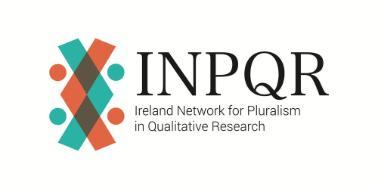Similar to the Network for Pluralism in Qualitative Research (NPQR: https://npqr. wordpress.com) the Ireland Network for Pluralistic Qualitative Research(INPQR) aims to provide information and resources for researchers interested in combining qualitative methods and analyses to investigate human experience. The methodological scope of the Network potentially extends to all qualitative methods and specifically aims to consider its application within and beyond the diversity of the field of psychology, within which it originated. With a specific focus on raising awareness in Ireland of the value of pluralistic qualitative research and how it can be conducted, the INPQR welcomes input from researchers in Ireland, using, thinking about using, or looking for collaboration (national or international) in pluralistic research. By focussing on research in Ireland and linking with members of the NPQR we hope to forge new partnerships and promote exciting and innovative research in all areas of psychology and allied practice.
Founding Members
The Network was founded in January 2019 with funding from the School of Applied Psychology, University College Cork. Its founding members each have an interest in qualitative research, and in the development of pluralistic qualitative research. With successof the initial funding application the Founding Members developed a Worksing Group to plan and launch the INPQR. It was important to include representation from across the research field so each member has a specific responsibility in addition to offering general input to the success of the Network development
Professor Nollaig Frost:
Nollaig developed her interest in pluralistic qualitative research during her doctoal studies. Keen to keep the research focus central to the study she became interested in the benefits and tensions of combinging qualitative methods to ask different questions of data. Subsequently, she worked with a research team of analysts to explore this further in the PQR Project, funded by Birkbeck, University of London and the Bristish Psychological Society. This led to the team writing the book Qualitative Research in Psychology: Combining Core Approaches (published by Open University Press) and the establishment of the network for Pluralism in Qualitative Research (NPQR), which offers resources, advice and support to researchers from around the world who have an interest in pluralistm. Since becoming and Adjunct Professor to the School of Applied Pscyhologyy at University College Cork, she has been keen to take up the generous support it has offered to develop a similar Network for pluralistic researchers in Ireland.
Dr Maria Dempsey:
I am a counselling psychologist and s lecturer in the School of Applied Psychology, University College Cork. I have worked on a number of professional education programmes and am the director of the MA in Applied Psychology (Mental Health) in the School of Applied Psychology, UCC. My research interest is concerned with developing knowledge of individuals’ understanding of self. While this has been realised in three primary areas, i.e. sexuality and parenting, mental health and reflective teaching and learning, the unifying cord through this work is methodology. In teaching research design and methodology to postgraduate students, I became interested in what, if anything, was not being considered fully in a data set when using one qualitative method. In what ways could working with a number of qualitative methods enhance understanding and capture diversity across a data set. Pluralism in qualitative research has become a means for me for extending conversation across a data set.
Dr Sarah Foley:
Sarah Foley is a Lecturer of Applied Psychology in University College Cork. Her research involves participatory qualitative work, with a particular interest in people with dementia. She is a lecturer of qualitative research methods, teaching students about pluralism in qualitative research.
Dr Philip Moore, Professional Practice and Clinical Trainees liaison:
Dr Philip Moore is Senior Lecturer in Clinical Psychology in the School of Applied Psychology, UCC. He
is qualified as a clinical psychologist for thirty years and has worked in various services in the UK and
Ireland since then. Prior to his current position, Philip was a Director of the National Counselling
Service (NCS), in the HSE for over eighteen years. His professional background is in clinical and
forensic psychology and psychotherapy. His main research interests are in the areas of
psychotherapeutic process with adults who have experienced childhood trauma, sex addiction
treatment and the arts/creative approaches in psychotherapy and clinical psychology training. His
practice is influenced by his interest in Jungian psychology. Philip is very interested in qualitative
psychology and pluralism and is delighted to be a member of the INPQR working group.
Lorna Bates: Learning and Students Liaison.
Danielle Murphy, Research Assistant and Technology Liaison.

